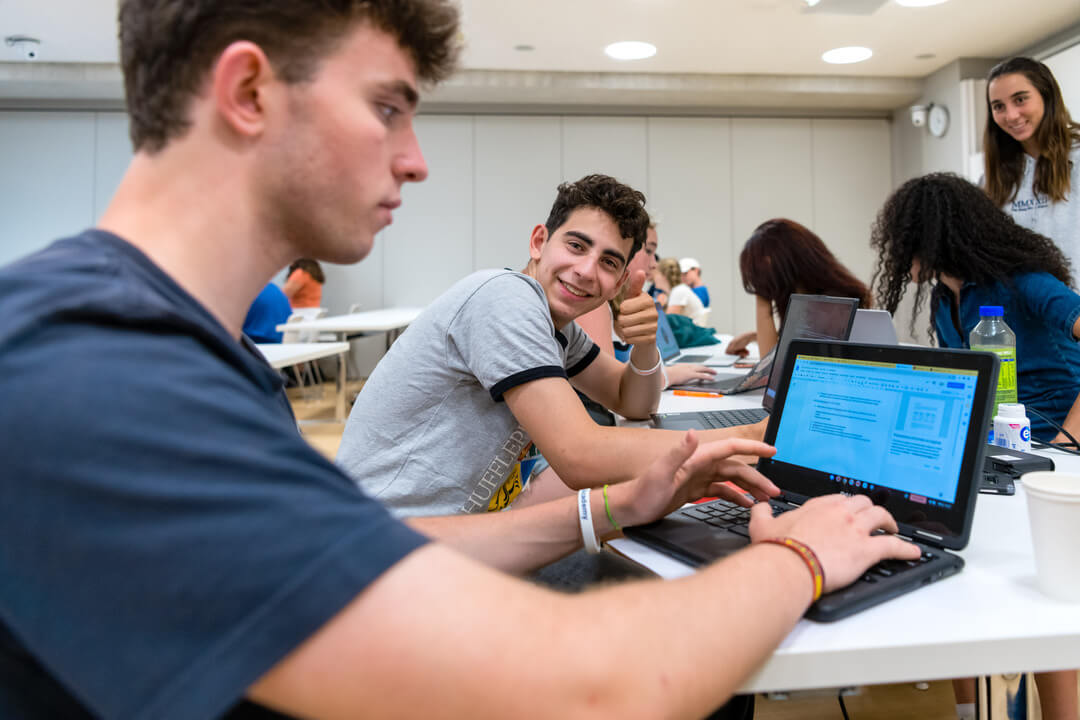There’s no shortage of opportunities for students to further cultivate their academic and personal profiles during the summer and, with myriad summer programmes and courses to choose from, deciding which summer options to pursue can often appear daunting or overwhelming.
Ensuring you use the summer to relax by the pool or spend time with friends is very important, but using some of the summer holiday for personal and educational enrichment comes with a variety of benefits that will last well beyond the following term.
With that in mind, why should you attend an international summer programme like our Oxford summer school?
Below we briefly outline the benefits of attending an international summer school, while also highlighting the different types of international summer school that might interest burgeoning young scholars.
Why Should You Attend an International Summer School?
There are lots of benefits to attending an international summer school, and this article will highlight just a few of the wonderful experiences that you can expect.
Opportunities for Cultural Exchange
Broadly speaking, an international summer school allows students of various academic, personal, and cultural backgrounds to embark on a journey of learning and discovery together. Students choose to focus on one transformational educational course, while experiencing a range of cultural adventures. This melding of social activity and academic rigour ensures a summer without a dull moment –– accompanied by friendships and memories that will last a lifetime!
Academic Benefits of Summer School
International summer schools are also beneficial in their investment in students’ academic potential and direction. By nurturing success and encouraging students to embark on a deeper exploration of a chosen subject, often via creative and independent means, summer schools prove an asset for both university applications and the fostering of student confidence when they return to the classroom.
Skills Beyond the Classroom
Furthermore, summer schools allow students to make informed decisions regarding their future direction by trying out a variety of academic subjects before university –– alleviating the stress that might otherwise accompany choosing a degree subject in the future!
Beyond increasing student independence and confidence, as young people navigate new cities and educational ventures, enrolment in an international summer school can also enhance cultural awareness and provide students with a plethora of new skills –– whether that be honing a new language or enhancing communication abilities!
Ultimately, the opportunities that can be found at a summer school are endless! Programmes like our residential summer school in Oxford offer a unique chance for students to grow as independent scholars and future leaders, while introducing cultural and social endeavours that will enrich their lives for years to come.
What are the Different Types of International Summer School?
In the same way that deciding to attend a summer programme comes with a variety of factors to consider, it is also important for students to consider the different types of summer school that might be of interest to them.
Here, we highlight the different types of international summer schools, and the benefits that can be found in each of them.
Language Programmes
A summer language programme is a course designed specifically to allow students to engage in a series of intensive classes, workshops, and cultural experiences that hone their fluency in their chosen language. Like other international programmes, language schools meld cultural heritage with academic rigour –– allowing students to authentically engage with the language they are studying in locations where it is spoken widely!
Language programmes provide linguistic immersion, solidifying grammar, vocabulary, oral skills, and writing competencies within that language. Living on the campuses of prestigious international universities, students are able to learn a language by immersing themselves in another culture, practising language skills in an authentic academic and social setting.
For more information on language programmes and the types of summer courses they might offer, you might like to explore options such as the International Summer School Session at the Hankuk University of Foreign Studies in Korea, where students are able to immerse themselves in the Korean language and culture through rigorous academic workshops and various excursions in and around Seoul.
Academic Programmes
An academic summer programme, like those offered by the Oxford Scholastica Academy, are typically two-to-four-week educational programmes aimed at high school students who are intending to apply to prestigious universities around the world.
While they are not directly linked to the universities themselves, they often make use of a leading institution’s facilities, accommodation and teaching spaces for the summer holiday.
There are various benefits to attending an international academic summer programme. In particular, summer schools allow students to develop a deeper understanding of their chosen subject area, while experiencing university-level study that can better prepare them for the academic rigour required by prestigious international universities. Additionally, students are able to improve their critical thinking skills and develop educational competencies that can inform future areas of research and decision-making.
Importantly, academic summer programmes derive great value from their international scope and the myriad cultures and backgrounds that are represented by the student population. By attending an academic summer programme, students are able to hear a variety of perspectives that might inform their academic research, while learning about the ways in which their chosen subject is studied across a variety of regions and cultures.
The Oxford Scholastica Academy offers numerous academic courses for the summer term, allowing students to embark on a deep study of their chosen subject(s) in one of the most prestigious academic settings in the world.
As an example of this, our Experience Medicine Academy has small class sizes to allow students to gain advanced technical and critical skills related to the study of medicine. These include the mastery of clinical skills, building a global professional network, and working with real-life patients during our Mock Clinic Challenge.
Similarly, our Experience Creative Writing Academy is a summer programme that challenges students to master key concepts in the subject, quiz successful young writers on their own careers, and engage with the same locations where authors like C.S. Lewis and J.R.R. Tolkien began their storied literary careers!
Cultural Programmes
Another type of international summer school is a cultural exchange programme, in which students use the summer break to deeply engage with another culture’s setting, histories, traditions, and global awareness.
A summer cultural programme is unique in that it provides students first-hand experience of another country’s culture and way of life, focusing on global connectedness for the entire summer period. This may include students living with a volunteer host family and sharing in their daily activities, or staying with a group of international students for the summer –– during which students will learn about the day-to-day routines and traditions of teenagers in another setting!
In choosing to attend a cultural programme, students can gain a variety of personal skills that will last them well-beyond the summer holiday. They will gain a deeper appreciation for and understanding of another culture, improve their intercultural communication skills through various excursions and develop a global perspective that can inform both their cultural awareness and their contributions to university and beyond.

How to Choose the Right Type of International Summer School for You
Given the various benefits that can be derived from each of the above summer offerings, it can be difficult to determine which type of international summer school might best serve your interests and goals. So, how can you choose the right type of international summer school for you?
While there is no exact formula for choosing the appropriate summer school, it may be useful for prospective students to consider the following tips and pieces of advice:
1. Programme Preference
Academic programmes focus on specific academic subjects and help students build knowledge and skills in those areas. They could be focused on high school courses or provide tasters of university or vocational education to help you get ahead and explore your options. Enrichment programmes, on the other hand, offer a broader range of activities, such as sports, arts, and language classes, in addition to academic subjects.
2. Personal Interests and Language Proficiency
Once a student has determined which programmes best fit their backgrounds, it’s useful for them to consider their individual interests and goals. This might include the specific subject they are interested in learning more about, the rigour of the universities they are considering applying to, and the type of academic or cultural environment that they feel is most relevant to their personal interests.
Additionally, students might take this opportunity to consider their proficiency in languages. Is there a certain language that is common within their chosen subject? Do they need to develop skills that are more specific to language proficiency? Additionally, are the international summer schools taught in languages that are relevant to their personal and academic goals?
If language proficiency is paramount to a student’s goals for the summer, they might consider enrolling in a language programme or cultural exchange programme, like those mentioned above.
3. Academic Strengths
If a student is interested in attending an academic programme, like an Oxford summer school, it will be important for them to take into account their existing academic interests, strengths and weaknesses. Once they have established the subject or subjects that most interest them –– these will likely be the areas they can see themselves potentially pursuing degrees in at undergraduate level –– they should consider their own academic background.
What are their strengths in the classroom? What are their weaknesses? What sort of learning style/academic setting is most beneficial for their needs and subject, and what sort of summer programme might be tailored to improving the skills they seek to cultivate?
This will be a useful way for students to determine the academic programmes that are most relevant to their academic goals, thus narrowing down the decision process once they have determined that an academic international summer school is the best fit for them.
Researching Different Types of International Summer Schools
It’s important that all students, regardless of their personal or educational backgrounds, take the time to adequately research the different types of international summer schools that are offered. Prospective students should take the time to consider the settings, cultures, and skills that they feel best fit their own goals –– especially as they look ahead to university applications.
In order to do this, students should research different international summer schools and their courses, reading reviews from previous students who have enrolled in these programmes. These ratings are often the best examples of the experiences that actual students had during summer school, and they are especially beneficial in providing prospective applicants the context necessary to making an informed decision.
The Oxford Scholastica Academy maintains a 4.9/5 star rating from 850+ verified reviews.

While the summer holiday is an opportunity for some well-deserved rest and relaxation, it’s also a wonderful chance for students to cultivate the personal and academic skills necessary to advance their goals. By attending an international summer school, students can begin to develop direction and confidence that will contribute to their long-term success at undergraduate level and beyond.
With these benefits in mind, it’s important that students choose the type of international summer school that is best for them. Language programmes, academic programmes and cultural programmes each come with numerous benefits, allowing students myriad cultural and educational experiences that can contribute to their future success. However, given the different focuses of each of these offerings, students should ensure they research their choice thoroughly before enrolling.
If you’re considering joining our flagship Oxford residential summer school, we’d love to hear from you. You can get in touch with Stephanie, our Head of Student Experience, who will be more than happy to answer your questions.





